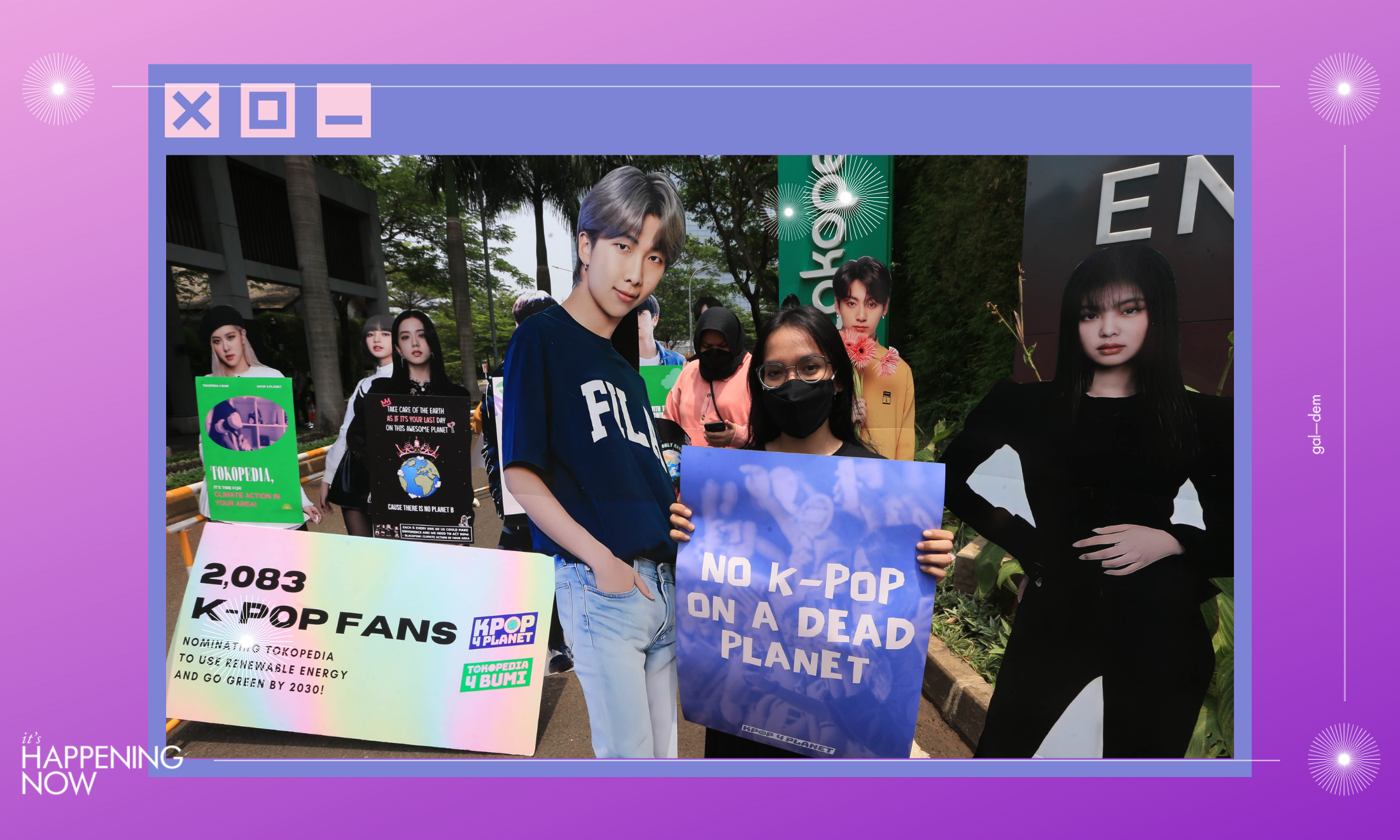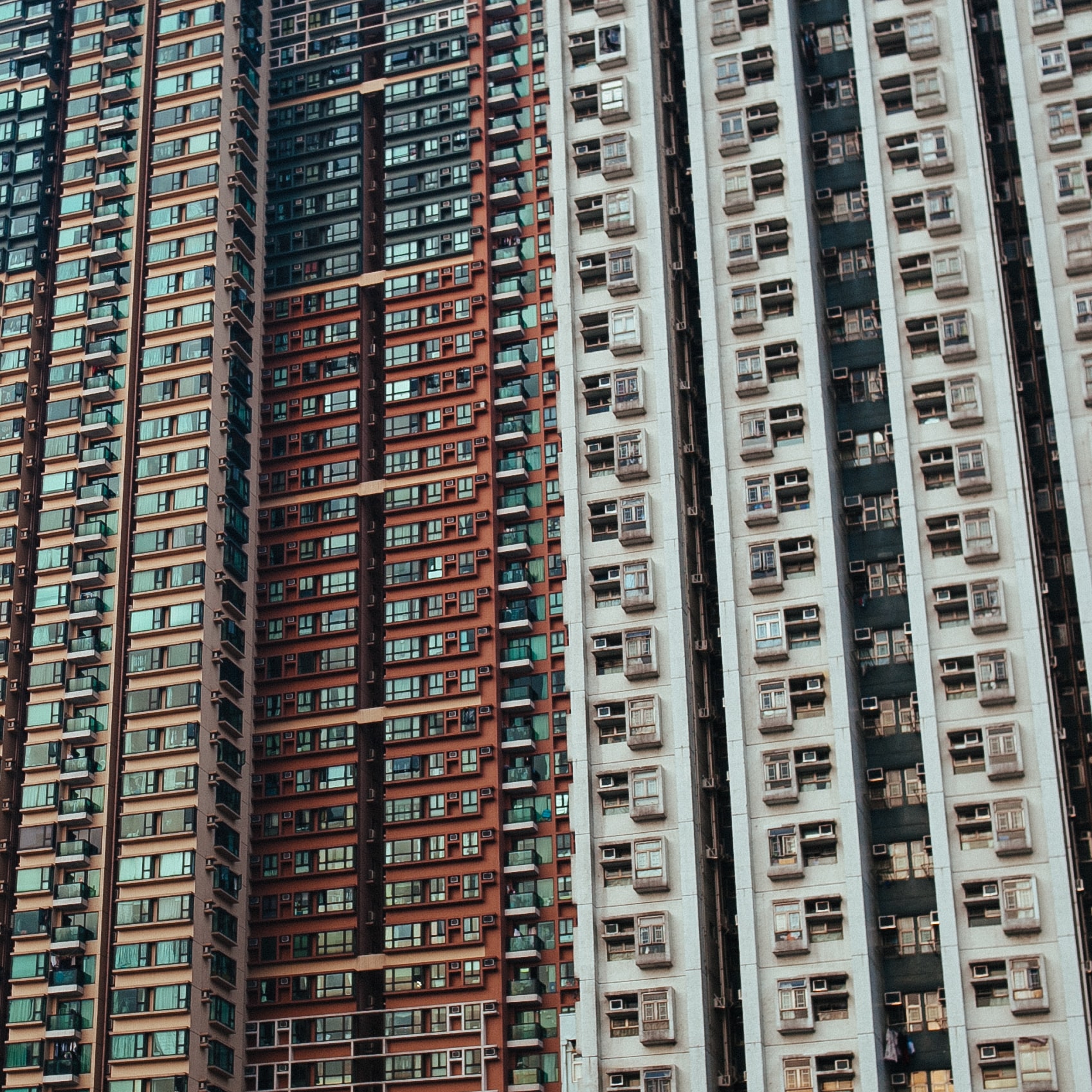
Kpop 4 Planet
Kpop 4 Planet wants a future where fans stan sustainably and corporations act responsibly
How the climate action group is harnessing the power of K-pop fandom to fight for the planet.
Kat Moon
25 Apr 2022
When Nurul Sarifah watched the Korean drama It’s Okay, That’s Love in 2014, one actor stood out. Doh Kyung-soo (stage name D.O.) played a high school student who was an aspiring writer, and the character intrigued her. Acting is just one of the star’s talents, and D.O. would become Sarifah’s gateway to K-pop. “I found out that he is an idol,” 22-year-old Sarifah, who lives in Jakarta, Indonesia, tells gal-dem. A fan of D.O.’s singing voice, she soon began to follow the K-pop group the artist belongs to – EXO. One song in particular solidified Sarifah’s status as an EXO-L (the name for the band’s fans): the group’s high-octane 2017 banger ‘Power.’ Sarifah loves the spirited energy of the song, which she says could be the soundtrack of the work that she currently devotes her day-to-day to: climate activism.
“We decided to combine both of the things that we love: which is K-pop and our planet”
Nurul Sarifah, Kpop 4 Planet organiser
In March 2021, Sarifah and two friends launched the fan-driven climate action platform Kpop 4 Planet. “We decided to combine both of the things that we love: which is K-pop and our planet,” she says. Sarifah describes it as a platform “created for those who enjoy K-pop music or other aspects of Korean culture, and then also have the desire to fight for climate justice.” In recent years, the mobilisation of K-pop fans has made global headlines through campaigns like the BTS ARMY raising more than $1 million for the Black Lives Matter movement in 2020 and K-pop fans more broadly drowning out hashtags including #BlueLivesMatter in the same year to fight for racial justice. Much of Kpop 4 Planet’s work focuses on harnessing this spirit of activism and social media savvy toward tackling the climate crisis. More specifically, the platform – which is funded by the Australian nonprofit Action Speaks Louder – encourages both online and offline action from fans to call for more sustainable practices from K-pop companies.
Since their launch, the group now encompasses six core members in Indonesia and South Korea, and has an ambassador programme that recently inducted 19 individuals to its 2022 class. The ambassadors are based in countries from the Philippines to Bangladesh; locations that are vulnerable to the impacts of climate change.
“Ambassadors are based in countries from the Philippines to Bangladesh; locations that are vulnerable to the impacts of climate change”
For Sarifah, the cause hits particularly close to home. “I live in Jakarta and there’s a lot of coal plants that are being built around the area and affect[ing] the locals because of the air pollution,” she explains. “We’ve also experienced floods and it’s becoming an annual thing, and then that makes me realise that the climate crisis is real.” In January 2022, Indonesia’s parliament approved a bill to relocate the country’s capital from Jakarta, which has been described as the world’s most rapidly sinking city. After Sarifah graduated from university in December, she began working full-time on Kpop 4 Planet along with five other members located in Asia.
Dayeon Lee, 19, joined Kpop 4 Planet the month the platform launched. Lee, who lives in Daegu, South Korea, has been a K-pop fan since elementary school, when she discovered the group Beast (now known as Highlight). Her passion for protecting the environment began in high school, and she was a member of the organisation Youth 4 Climate Action when Sarifah reached out, looking for a Korean activist to join the group. “It was a great opportunity to do two of my favourite things – being [a] K-pop fan and doing climate action,” says Lee.
As someone who has been a K-pop fan since her high school days, 28 year-old Yusun Chin has seen a shift in fandom behaviour in the past decade. “When I was a fan in high school and college, I was definitely not as socially engaged as these fans I see now,” says Chin, who lives in Seoul, South Korea and coordinates media and communications for Kpop 4 Planet. “Maybe there were social movements going on back then, but I wasn’t aware of them.” Chin adds that social media has played a major role in the rise of online activism. “I don’t think that fans were connected to each other and able to mobilise on a scale that they’re able to now, just because Twitter and Instagram are so much more developed and accessible in so many areas around the world,” she explains. Chin is excited by the fan-driven activism surrounding the climate crisis and other causes. “K-pop fans have the stereotype that they only care about the K-pop idols,” Lee says. “However, actually K-pop fans are really concerned about a lot of social issues.”
Among Kpop 4 Planet’s biggest campaigns is No K-pop on a Dead Planet. Launched in the summer of 2021, the ongoing project involves an online petition that urged entertainment companies to “make K-pop sustainable by reducing plastic and hosting waste-free concerts.” It garnered more than 10,000 signatures, after which Kpop 4 Planet emailed the petition to HYBE, SM, JYP, and YG – entertainment companies widely considered as the biggest players in K-pop right now. Though Kpop 4 Planet has not gotten a response from the companies, there are some promising signs of change in the area of eco-friendly album packaging – one core part of the campaign.
“The K-pop industry should also feel responsible for the huge amount of album waste that they produce”
Dayeon Lee, member of Kpop 4 Planet
Across K-pop fandoms, physical albums – primarily made of plastic – are hugely popular, giving fans the opportunity to enter lotteries for meet-and-greet fansigns, and boosting idols’ positions on music charts and at award shows. Physical albums are also coveted because of the polaroid-sized photo cards included in them, often two or three pictures of K-pop group members that fans collect or trade with each other. According to Yonhap News Agency, the Korean music chart Gaon reported that more than 57 million K-pop physical albums were sold in 2021 – up 36.9% from roughly 42 million in 2020. Yet many of these albums are produced at significant cost to the environment. “As the plastic issues are getting more serious all over the world, I think the K-pop industry should also feel responsible for the huge amount of album waste that they produce,” Lee says. The group has called for companies to make physical albums with less plastic and more sustainable materials.
Sarifah says YG, home to powerhouse acts like Big Bang and Blackpink, has released two recent albums with greener packaging. In December, the company announced that it would use sustainable materials in the production of To Infinity, the third full-length project by Winner’s Mino. The Korea Times reported that YG used paper certified by the Forest Stewardship Council and low-carbon paper, as well as “bean oil for printing and minimised the use of chemicals such as benzol and isopropyl alcohol (IPA).” In January, YG shared that it would take a similar approach with its production of The Second Step: Chapter One—the new project from the 12-member act Treasure.
There is also Victon, the group from IST Entertainment, who recently offered an alternative to the traditional physical album release. In January, the group announced a “Platform” version of their upcoming release Chronograph in addition to a regular physical album version. Fans who purchased the “Platform” version would get photo cards mailed to them, and would also receive a code to download the album digitally. Activists like Sarifah hope this release will help set a trend in labels offering eco-friendly album options.
Another central part of No K-pop on a Dead Planet involves calling for entertainment companies to host concerts that produce less waste. Sarifah cites examples, like Billie Eilish’s 2020 world tour partnership with Reverb, a nonprofit dedicated to making music events more green, and Coldplay’s pledge to cut their CO2 emissions by half for their 2022 tour compared with their 2016-17 world tour. Coldplay also shared plans to install “kinetic flooring” where fans’ movement would be harnessed into energy. “We were thinking it’s probably good if K-pop concerts also have this because a lot of fans totally dance,” Sarifah says.
“Through Kpop 4 Planet, we are hoping that we can give some sort of new perspective and show a different side of K-pop fans”
Nurul Sarifah
The efforts of No K-pop on a Dead Planet resulted in a panel in December at South Korea’s National Assembly. Members from corporations including Naver – the company behind Korea’s leading search engine, Kakao Entertainment, Korean Broadcasting System (KBS) attended, along with politician Lee Won-wook, who is the Chairman of the National Assembly’s Science, ICT, Broadcasting and Communications Committee. Representing Kpop 4 Planet at the panel of senior leaders, Dayeon Lee spoke about the campaign and made the case for why the industry should start to take climate action. “It was the first time that we got people from the industry to sit down with us and listen to what we’ve been doing and listen to why we think it’s important to campaign on these issues,” says comms coordinator Chin.
Chin hopes that more entertainment companies, including HYBE, SM, JYP, and YG, will respond to their outreach around No K-pop on a Dead Planet. “To be honest, it’s been really difficult to get a response from them,” she says. “But hopefully, as we engage more fans with different campaigns and find different ways of pressuring them, they will be open to having a dialogue with us.”
Kpop 4 Planet’s initiatives in 2022 include raising awareness about deforestation and launching a program that collects albums. For years, fans of different groups have planted trees or forests in honour of their favourite idols’ birthdays, debut anniversaries, and other events. Building on this, alongside discussions about deforestation, Kpop 4 Planet plans to create an online global map to track these trees and forests that have been planted around the world by fandoms. The group also kicked off an album collecting project in March that encourages fans in Korea to donate unused albums, collecting more than 8,000 as of April 21. As part of the ongoing No K-pop on a Dead Planet campaign, Kpop 4 Planet is delivering the albums to their respective entertainment companies with the goal of pushing for more eco-friendly options.
As the group continues to call for companies to adopt sustainable measures, it’s inevitable that Kpop 4 Planet’s actions will also impact people’s views of K-pop fans – and perhaps contribute to reducing stereotypes about the community. “Through Kpop 4 Planet, we are hoping that we can give some sort of new perspective and show a different side of K-pop fans,” Sarifah says, one where “they have a positive impact not only for themselves or their friends or their idols – but also on the society and the environment.”
Like what you’re reading? Our groundbreaking journalism relies on the crucial support of a community of gal-dem members. We would not be able to continue to hold truth to power in this industry without them, and you can support us from £5 per month – less than a weekly coffee.
Our members get exclusive access to events, discounts from independent brands, newsletters from our editors, quarterly gifts, print magazines, and so much more!









